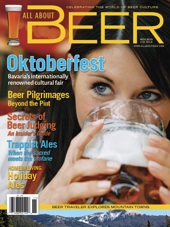We’ll Have a Barrel of Funk
The hard working microbes that transform malt-water into beer may be but humble single-celled organisms, but nature has equipped them with a potent survival mechanism—they’re amazingly adaptive. And, given enough nutrients, they’re all too happy to call the inside of an oak barrel home. As yeasts and bacteria reproduce, successive generations adapt to the particulars of their local biotic niche, modifying their own biochemistry in the process—they go native.
In the never-ending imperative of survival of the fittest, microbes living in oak barrels may compete against one another until a better-adapted or faster-growing strain comes to dominate its neighbors. For brewers, this means that beers brewed to standard recipes may assume notably different qualities from year to year and from batch to batch.
To account for this, brewers must taste their beer at frequent intervals as it matures and may opt to blend aged ales with younger ones to achieve consistency. They may clean barrels between batches and re-pitch native yeasts, or let the microbes go wild and accept whatever outcome nature would seem to prefer. The relatively few American brewers exploring these scenarios are still in their early stages of experimentation and discovery.
One such brewer is Ron Jeffries, owner and founder of Jolly Pumpkin Artisan Ales in Dexter, MI. Jolly Pumpkin brews Belgian-inspired, oak-aged ales exclusively. Most receive a primary fermentation with a laboratory-derived Saccharomyces ale yeast. Open fermenters assure some contact with native microbes.
But Jolly Pumpkin beers get their mojo from quality time spent in oak barrels. Jeffries acquires barrels from a number of sources, including bourbon barrels from Kentucky and from other breweries. He also uses wine barrels from local wineries that are likely to harbor both wine yeasts and local microbes. (Yes, there are wineries in Michigan.)
“All barrels have natural yeasts and souring bacteria,” contends Jeffries who has a science background at the University of Michigan. So, to properly balance the acidic tartness and barnyard funkiness they contribute, Jeffries employs a complex regimen of barrel conditioning, blending and bottle conditioning.
As with the original Belgian lambics, Jolly Pumpkin uses 30% non-malted wheat in its lambic-style ales. Most of their other ales also incorporate some wheat malts. “Wheat lightens the body,” says Jefferies. “Lambic-style beers shouldn’t be overly sweet.”











